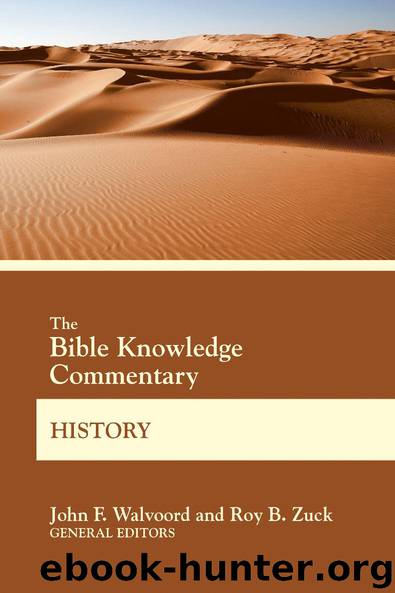The Bible Knowledge Commentary: History by Unknown

Author:Unknown
Language: eng
Format: epub
Tags: ezra;ark;judean;postexilic;elijah;kings of aram;levite towns;paga gods;godesses;abraham;david;zadok
Publisher: David C. Cook
Published: 2018-02-19T15:43:08+00:00
17:5-6. Elijah obeyed the LORD, who miraculously provided for him as He had promised. God directed ravens, birds that normally neglect their own young (cf. Job. 38:41), to bring bread and meat faithfully to Elijah every morning and evening. And he drank water from the brook. The Hebrew word for “bread” (le ḥem) means food in general, possibly including berries, fruit, nuts, eggs, etc. Perhaps they were brought from a distance where the drought had not yet affected the vegetation. Through this unusual manner of nourishing His prophet physically, God was also nourishing Elijah’s faith for later feats of spiritual strength (see the list “God’s Miracles through Elijah and Elisha,” near 2 Kings 2:13-14).
b. Elijah’s ministry at Zarephath (17:7-24)
17:7. How long Elijah stayed at the brook is not revealed. Some time later it dried up because of the drought which lasted three and one-half years in all (Luke 4:25; James 5:17). Elijah had learned that God would miraculously provide for him, but now he would learn that God could do the same for others-even Gentiles--as well. God was preparing His servant for a great showdown on Mount Carmel.
17:8-11. Elijah was directed to Zarephath, a town on the Mediterranean coast between Tyre and Sidon in Phoenicia, the homeland of Jezebel (cf. 16:31) and the heart of Baal-Melqart territory (see the map “Elijah’s Travels”). Zarephath was 80-90 miles from Kerith. God told Elijah that a widow would feed him (cf. Luke 4:25-26). Widows were usually poor people; normally they ran out of food first in a famine. This famine had been created by the drought. Therefore going to a widow for food was a strange directive. God was again using an unusual source to feed His prophet.
Obediently Elijah made his way to Zarephath. When he entered the town he tested the first widow he saw by asking her for a drink. Her favorable response led him to request a piece of bread.
17:12-16. The widow recognized Elijah as an Israelite and appealed to Yahweh in affirming that she had no bread; she had only a little flour and oil, enough for a last meal for her son and herself. Here was a Gentile woman in Phoenicia who believed in the Lord; she said she believed He is alive (As surely as the LORD your God lives; cf. v. 1; 18:10).
Elijah calmed her fears of himself, her hunger, and her imminent death. He asked her to feed him first ... and then use what was left to feed herself and her son. Then he gave her a promise on the authority of the word of God: she would have food until the drought ended.
Her obedient response demonstrated her faith in the word of the LORD. The Lord honored her faith by fulfilling His promise miraculously. This miracle of God’s continually supplying flour and olive oil was another polemic (protest) against Baal, just as was the drought. Baal-worshipers believed he was a fertility god, giving rain to make crops grow.
Download
This site does not store any files on its server. We only index and link to content provided by other sites. Please contact the content providers to delete copyright contents if any and email us, we'll remove relevant links or contents immediately.
Kathy Andrews Collection by Kathy Andrews(11819)
The remains of the day by Kazuo Ishiguro(8990)
Spare by Prince Harry The Duke of Sussex(5188)
Paper Towns by Green John(5186)
The Body: A Guide for Occupants by Bill Bryson(5089)
Industrial Automation from Scratch: A hands-on guide to using sensors, actuators, PLCs, HMIs, and SCADA to automate industrial processes by Olushola Akande(5058)
Machine Learning at Scale with H2O by Gregory Keys | David Whiting(4307)
Be in a Treehouse by Pete Nelson(4047)
Never by Ken Follett(3945)
Harry Potter and the Goblet Of Fire by J.K. Rowling(3851)
Goodbye Paradise(3804)
The Remains of the Day by Kazuo Ishiguro(3402)
Into Thin Air by Jon Krakauer(3391)
Fairy Tale by Stephen King(3379)
The Cellar by Natasha Preston(3340)
The Genius of Japanese Carpentry by Azby Brown(3300)
120 Days of Sodom by Marquis de Sade(3270)
Reminders of Him: A Novel by Colleen Hoover(3103)
Drawing Shortcuts: Developing Quick Drawing Skills Using Today's Technology by Leggitt Jim(3079)
